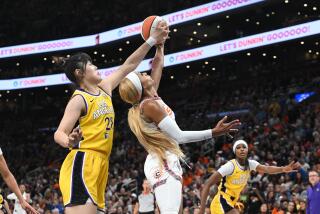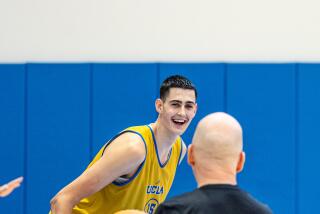7-foot-9 Chinese player seeking NBA career
- Share via
GREENSBORO, N.C. — Sun Ming Ming’s hands are enormous. He catches a basketball with one hand, as a baseball player might with a mitt. They are hands with the touch of a shooting guard, able to sink one 20-foot jumper after another.
Sun is no guard -- at nearly 7-foot-9, he would be the tallest player in NBA history. But the pituitary tumor that led to his extraordinary size is threatening his life and keeping him away from a pro basketball career.
He recently underwent a second operation, though it could be years before Sun and his doctors find out if it was a success. Until then, he’s doing what he can to prepare his body for the rigors of pro sports.
“When he first came here, he acted like a 60-year-old man,” said Rocky Manning, who allowed Sun to stay with his family when he moved from China to the United States nearly two years ago. “He sat around and didn’t say much. He had a hard time just raising his arm above his head. If he would hold onto the net it would hurt. He hated dunking the ball.”
The 23-year-old Sun has acromegaly, a condition caused by a tumor that leads his pituitary gland to overproduce growth hormone. It’s why Sun is not only so tall, but weighs 387 pounds and has a 50-inch waist, a size that puts tremendous pressure on his joints. The tumor also limits testosterone production -- which means he lacks strength, stamina and speed.
“In China, I would get tired running,” Sun said. “I didn’t know until I came here that I have a tumor.”
It’s rare that a case of acromegaly is diagnosed so late. A native of Harbin in extreme northeastern China, Sun grew up poor and in middle school was sent to a state-run basketball academy. He played on a lower-level pro team, but didn’t have access to quality medical care.
Had he lived in the U.S., there’s little chance his condition would have gone untreated for so long, said Stephen Tatter, a neurosurgeon at Wake Forest’s Baptist Medical Center.
“It’s the kind of thing that if you saw a kid who was growing that fast, you would kind of walk over and hand his parents a card and tell them to come and see me,” Tatter said.
Without treatment, it wasn’t only Sun’s basketball career that was threatened. Tatter’s partner at Wake Forest’s Gamma Knife Center, Volker Stieber, said patients with acromegaly tend to die from heart failure at a young age, usually in their 30s or 40s.
“To put it simply, they tend to outgrow their hearts, so to speak,” Stieber said.
Manning, who owns a packaging company, footed most of the $100,000 bill for Sun’s first surgery last year, but doctors in Los Angeles were able to remove only part of the tumor because it was wrapped around Sun’s optic nerve and they feared he could go blind.
Late last month, Stieber and Tatter performed a second, knifeless surgery on Sun called gamma knife radiosurgery. It involved beaming a targeted dose of radiation through the skull, and it’s hoped that within one to three years the tumor will dissolve and his hormone levels will become normal.
Manning said Sun’s stamina improved greatly after the first surgery, when he was able to lift weights for the first time in his life. Following the second procedure, Manning said, Sun is able to train for six to seven hours a day.
“He’s lifting weights, running, stretching and playing basketball,” Manning said. “His stamina, the way he feels, the way he acts, is totally different, like night and day.”
NBA executives have shied away from Sun because of his medical problems, but his size alone could raise interest if the second surgery is a success.
“Those guys take up space. They make you do things you don’t want to do,” Charlotte Bobcats Coach and General Manager Bernie Bickerstaff said. “You remember big [Mark] Eaton of Utah? He wasn’t agile, but he made you change your offense.”
Sun’s lone stint with an American pro team was last season in Kansas with the Dodge City Legend of the United States Basketball League. He joined the team shortly after his first surgery and wasn’t in good shape. He played sparingly and thinks he didn’t get a chance to show his skills.
“It was a small town,” Sun said of Dodge City. “The weather was no good, the people were nice. But I played very, very little.”
Along with his size and bulk -- he’s not skinny like Shawn Bradley or Manute Bol -- Sun has a nice shooting touch with a fluid stroke. He consistently hit outside shots during a recent workout.
“I definitely think he can play in the NBA,” Manning said. “He’s an awesome shooter. He hit 59 free throws in a row the other day. There aren’t many big guys who shoot like he does. He just needs to run the court a little faster.”
That’s the weakest part of Sun’s game. He has trouble moving up and down the court and still tires easily. Sun hopes to start auditioning for NBA teams early next year, although his doctors caution it will still be a few years before he could be completely healthy. His visa is scheduled to expire in July 2008.
“We’re really in no hurry,” Manning said. “He’s only 23, so we don’t want to throw him out there when he’s not ready. He feels so much better now. He laughs. He jokes. Most people don’t see that. He loves our kids, our animals.”
Sun has learned enough English in the past year to hold a conversation and he’s scheduled to play a small role in an upcoming Jackie Chan movie. But his focus remains on playing in the NBA.
“I hope I will feel much, much better so I can play basketball, get strong and make some team,” Sun said. “That’s what I hope.”
More to Read
All things Lakers, all the time.
Get all the Lakers news you need in Dan Woike's weekly newsletter.
You may occasionally receive promotional content from the Los Angeles Times.









